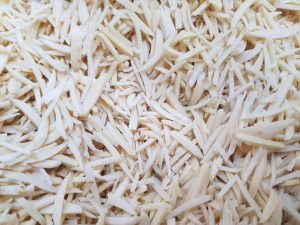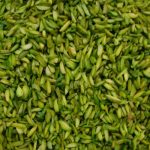The almond is a tree nut native to the Mediterranean region. Historically, almond trees grew there wild and were later cultivated as early as 3000 BC.
Almond Rich in
- Vitamin E
- Monounsaturated fats
- Fiber
- Biotin
- Minerals: Calcium, Phosphorus, Magnesium
- Trace minerals: Copper
- Phytonutrients, specifically flavonoids, plant sterols, phenolic acids

Interestingly, despite nuts being calorie-dense, research does not support a link with nut intake and weight gain. In fact, they have been associated with less weight gain and a lower risk of obesity, possibly because the fat and fiber content help to improve feelings of satisfaction and fullness.
Observational studies looking at intakes of nuts have found a significantly lower risk of heart disease in those eating nuts at least four times a week. They may be purchased whole, sliced, chopped, or slivered. Almond slice are usually used as decorations of food. It is best to store almonds in a cool, dark, dry location. If kept at temperatures less than 40°F, almonds can be stored for about two years.


